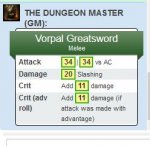Most dice actally have a bias to them. Slight imperfections in the molding or polishing processes will result in differing balance or face shapes. These are usually so minor as to be imperceptible without special testing (like the extensive testing done on "Las Vegas" dice). But sometimes a bubble in a die is large enough to noticable affect the rolls. Or a dice face is somewhat rounded or smaller (or larger) than the others. The player may or may not be aware of the dice bias, he may truly just think it is lucky.
A dice manufacturer once gave me a bunch of sample dice. He said he didn't make transparent dice because nobody wanted to buy dice when they had bubbles in them, which made me suspicious. Not wanting to roll and record results for 1000s of rolls, I put the dice in water. Most sank, some floated (they were all the same color). Most of those that floated each, when poked and dunked, resettled to either the same number or to a shared edge or point. Every "roll". A few seemed to still be balanced.
I then poked and spun those that sank. Many of them still settled favoring the same face or edge or point.
We never bought any dice from that manufacturer, and I'm pretty sure he went out of the dice business.



